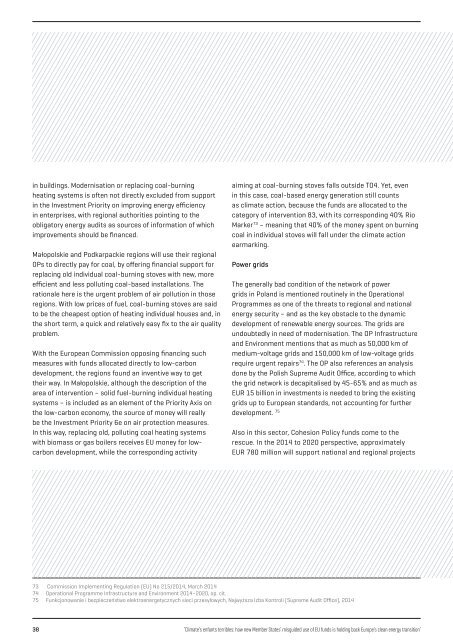ENFANTS TERRIBLES
enfants-terribles
enfants-terribles
Create successful ePaper yourself
Turn your PDF publications into a flip-book with our unique Google optimized e-Paper software.
in buildings. Modernisation or replacing coal-burning<br />
heating systems is often not directly excluded from support<br />
in the Investment Priority on improving energy efficiency<br />
in enterprises, with regional authorities pointing to the<br />
obligatory energy audits as sources of information of which<br />
improvements should be financed.<br />
Małopolskie and Podkarpackie regions will use their regional<br />
OPs to directly pay for coal, by offering financial support for<br />
replacing old individual coal-burning stoves with new, more<br />
efficient and less polluting coal-based installations. The<br />
rationale here is the urgent problem of air pollution in those<br />
regions. With low prices of fuel, coal-burning stoves are said<br />
to be the cheapest option of heating individual houses and, in<br />
the short term, a quick and relatively easy fix to the air quality<br />
problem.<br />
With the European Commission opposing financing such<br />
measures with funds allocated directly to low-carbon<br />
development, the regions found an inventive way to get<br />
their way. In Małopolskie, although the description of the<br />
area of intervention – solid fuel-burning individual heating<br />
systems – is included as an element of the Priority Axis on<br />
the low-carbon economy, the source of money will really<br />
be the Investment Priority 6e on air protection measures.<br />
In this way, replacing old, polluting coal heating systems<br />
with biomass or gas boilers receives EU money for lowcarbon<br />
development, while the corresponding activity<br />
aiming at coal-burning stoves falls outside TO4. Yet, even<br />
in this case, coal-based energy generation still counts<br />
as climate action, because the funds are allocated to the<br />
category of intervention 83, with its corresponding 40% Rio<br />
Marker 73 – meaning that 40% of the money spent on burning<br />
coal in individual stoves will fall under the climate action<br />
earmarking.<br />
Power grids<br />
The generally bad condition of the network of power<br />
grids in Poland is mentioned routinely in the Operational<br />
Programmes as one of the threats to regional and national<br />
energy security – and as the key obstacle to the dynamic<br />
development of renewable energy sources. The grids are<br />
undoubtedly in need of modernisation. The OP Infrastructure<br />
and Environment mentions that as much as 50,000 km of<br />
medium-voltage grids and 150,000 km of low-voltage grids<br />
require urgent repairs 74 . The OP also references an analysis<br />
done by the Polish Supreme Audit Office, according to which<br />
the grid network is decapitalised by 45-65% and as much as<br />
EUR 15 billion in investments is needed to bring the existing<br />
grids up to European standards, not accounting for further<br />
development. 75<br />
Also in this sector, Cohesion Policy funds come to the<br />
rescue. In the 2014 to 2020 perspective, approximately<br />
EUR 780 million will support national and regional projects<br />
73<br />
74<br />
75<br />
Commission Implementing Regulation (EU) No 215/2014, March 2014<br />
Operational Programme Infrastructure and Environment 2014–2020, op. cit.<br />
Funkcjonowanie i bezpieczeństwo elektroenergetycznych sieci przesyłowych, Najwyższa Izba Kontroli (Supreme Audit Office), 2014<br />
38<br />
‘Climate’s enfants terribles: how new Member States’ misguided use of EU funds is holding back Europe’s clean energy transition’


